Table of Contents
Table of Contents
- What is SEO tracking?
- What does SEO tracking involve?
- The 5 most important SEO metrics your agency should track
- The best SEO tracking tools & software in the industry
- How to use AgencyAnalytics for SEO performance tracking and reporting
- Key takeaways: SEO tracking requires a strategy and consistent effort
7,000+ agencies have ditched manual reports. You can too.
Free 14-Day TrialQUICK SUMMARY:
SEO tracking assesses a client’s organic search performance through key metrics like keyword rankings, organic traffic, and conversions. It gives agencies the clarity needed to align SEO efforts with real business objectives—whether that’s improving visibility, earning placement in AI-influenced search results, increasing qualified clicks, or driving revenue. This guide breaks down top SEO metrics to track, SEO tools to get the job done, and the importance of an all-in-one reporting solution.
SEO tracking helps agencies understand what’s driving performance in organic search. Instead of relying on assumptions, it provides clear evidence of what’s working and where strategies need to evolve.
With the right metrics in place, it’s easier to identify high-performing pages, impactful keywords, and meaningful opportunities for optimization. And over time, any gains in rankings, visibility, and qualified traffic prove the value of SEO and strengthen client confidence.
That said, search has evolved rapidly, and AI has transformed how results are presented. Even so, SEO remains an important piece of the puzzle. Search visibility still depends on relevance, authority, and technical performance. And SEO tracking is what ties those efforts to real, measurable outcomes.
Not sure where to start? This guide focuses on the SEO metrics worth tracking, the tools that support efficient analysis, and practical ways to communicate results to clients.
What is SEO tracking?
SEO tracking is the process of monitoring and analyzing how a client’s website performs in search engines. It’s used to determine which strategies drive traffic, improve keyword rankings, and increase search visibility. It also reveals how those efforts contribute to conversions, leads, and long-term business outcomes.
For clients, SEO tracking also provides transparency. It gives them clear, data-backed insights into how your efforts are helping them achieve search visibility.
What does SEO tracking involve?
SEO tracking requires more than watching search rankings or traffic numbers. A complete strategy looks at:
How users find and interact with a client’s content.
How search engines crawl the site.
How performance evolves over time.
Each of the elements below reveals something different. Together, they paint a clear picture of what’s working and where to optimize–let’s explore further.
Ranking & position tracking
This exercise involves monitoring keyword ranking positions in search engine results pages (SERPs). Higher rankings enhance a website's visibility, thereby increasing the likelihood of organic traffic and inclusion in AI-assisted search results.
Additionally, ranking and position tracking is handy for:
Competitor benchmarking: Compare keyword rankings against competitors to identify gaps and opportunities for outranking them.
Strategic adjustments: Use ranking data to refine content, optimize underperforming pages, and focus efforts on relevant keywords.
SERP tracking
SERP tracking monitors a website’s presence in search features, which reflects visibility beyond traditional rankings.
While AI has altered how users interact with search, showing up in SERP features remains critical for establishing credibility and authority. These placements position a client’s brand as a trusted source, even when users don’t click through to a website.
Some prominent SERP placements include:
AI overviews: AI-generated summaries that appear at the top of search results for certain queries. They synthesize information from multiple sources to provide quick answers and may reference or link to ranking webpages.
Local map packs: A set of local business listings displayed on Google Maps and search results for location-based search queries.
Knowledge panels: Information boxes that appear on Google’s organic search results to provide quick facts about a person, place, or topic.
Video carousels: A horizontal scrollable section in search results showcasing video content related to the query.
People Also Ask (PAA): A dynamic box in search results featuring related questions and their brief answers.
Featured snippets: A highlighted answer box at the top of search results, extracted from a webpage to address a query directly.
Featured snippets are powerful, but you need to be very careful with how you go about getting them. Focus on high-quality content that is well structured, has proper schema attributed to it, and includes proper keywords to answer a user's question.
Rachel Jackson, Lead SEO Specialist, Wit Digital
That said, capturing SERP feature visibility isn't guaranteed, even if all your client’s SEO ducks are in a row. However, tracking top-performing content and competitor activity will show what search algorithms favor for specific queries.
Log file tracking
This exercise involves analyzing server log files to understand how search engine crawlers interact with your client’s website. This analysis enables agencies to identify technical SEO issues, validate crawl behavior, and ensure that critical content is discovered (both for indexing and AI-assisted search results).
Use log file tracking to:
Ensure crawl efficiency: Identify which pages are being crawled and how often, which ensures the most important pages are prioritized.
Detect errors: Spot issues like broken links, 404 errors, and server response problems that might prevent pages from being indexed correctly.
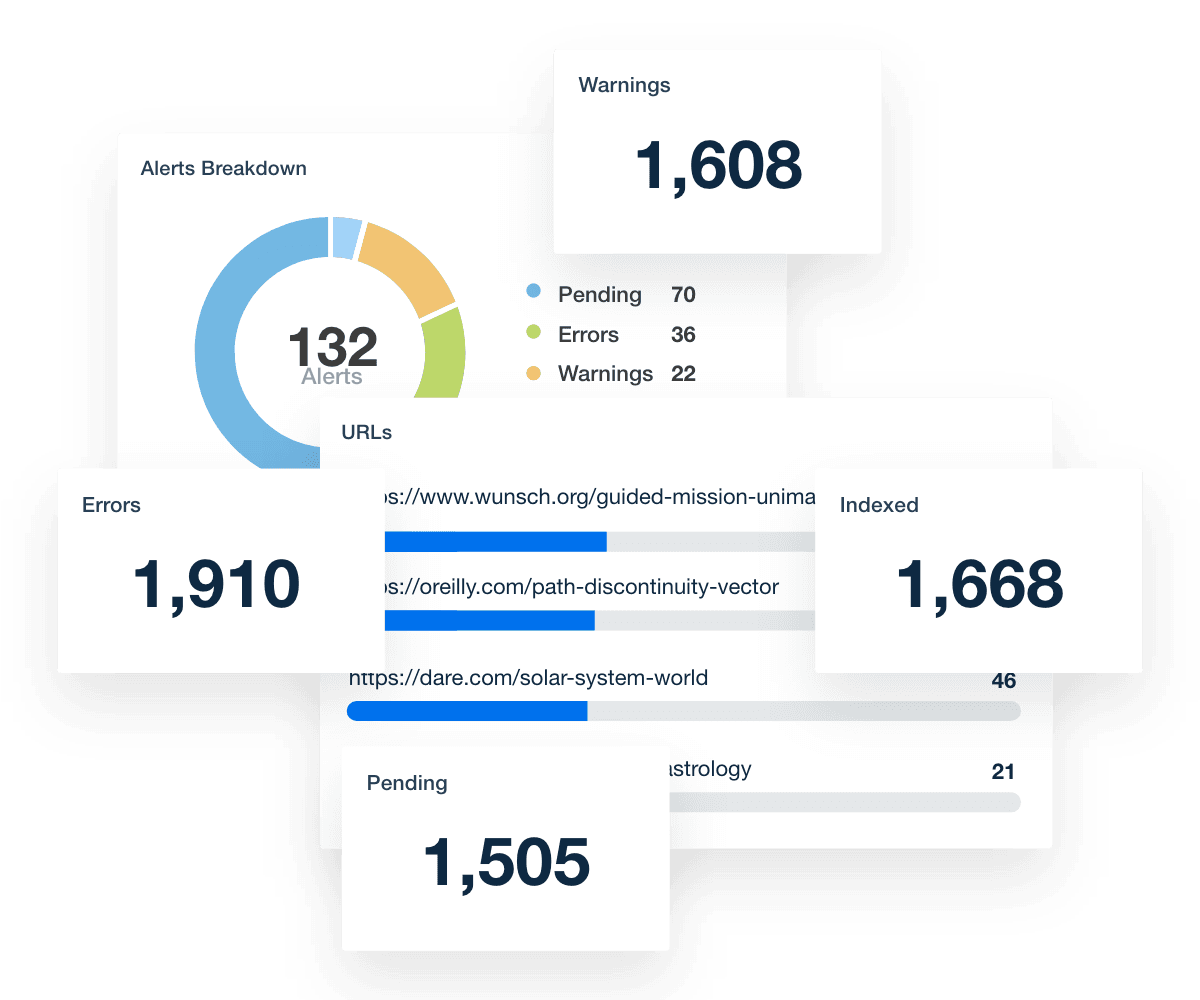
Identify crawl errors, sitemap alerts, and top keyword queries with the Google Search Console integration. Streamline SEO reporting with AgencyAnalytics–try it free for 14 days.
Click tracking
Click tracking analyzes how users interact with search results and website elements, such as links, buttons, and calls-to-action (CTAs). This data helps agencies to analyze user behavior, evaluate meta descriptions, and measure headline effectiveness. It also identifies how engagement patterns change as AI-generated results and zero-click experiences become more common.
Use click tracking to:
Identify high-value elements: Pinpoint which website elements drive the most clicks. Then, use this to prioritize updates to key pages and links that still attract engagement.
Optimize conversion paths: Analyze user navigation to identify drop-offs, refine website design, and curate content that increases conversion potential.
Action tracking
Action tracking focuses on specific user behaviors beyond clicks (e.g., form submissions, downloads, video plays, and image clicks). It also provides deeper insight into user engagement and page functionality.
This is useful for:
Measuring engagement: Evaluate which actions users complete most often, place CTAs in strategic locations, and optimize page layouts. This will increase the chances of encouraging deeper interaction once users reach the site.
Refining user journeys: Identify barriers within the conversion process and streamline user pathways to improve outcomes and overall experience.
Tracking cycles
Tracking cycles are the set intervals when SEO data is reviewed to guide strategic updates, prioritize opportunities, and catch issues early.
By keeping a watchful eye on SEO efforts, you’ll be able to:
Monitor emerging trends: Identify shifts in keyword rankings, traffic, SERP feature visibility, AI-generated mentions, and user behavior.
Maintain accountability: Provide clients with consistent updates on progress, which showcases the value of your SEO services.
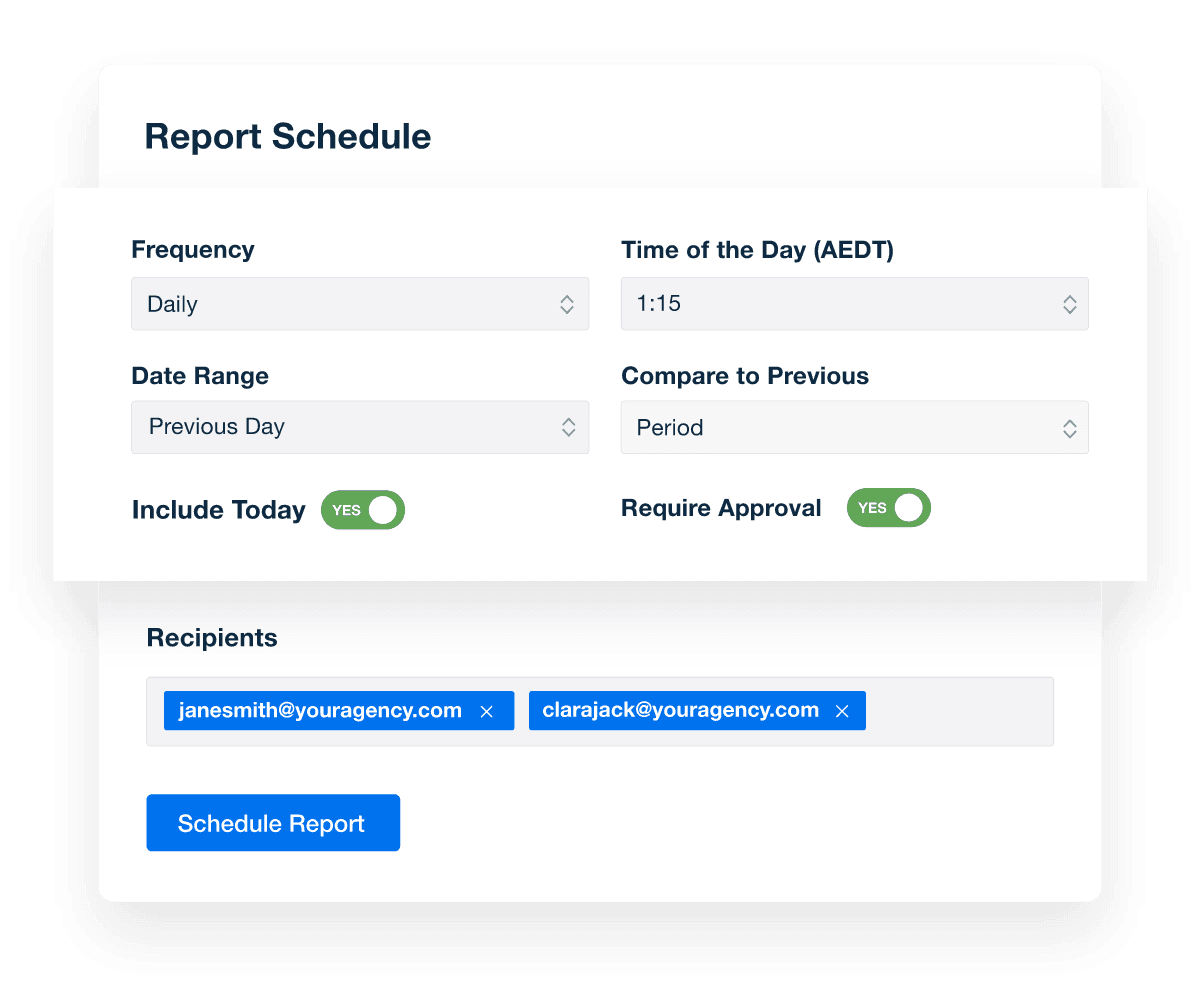
Keep clients in the loop by automatically scheduling their reports. Demonstrate professionalism and enhance operational efficiency–try this feauture in AgencyAnalytics, free for 14 days.
Competitor SEO tracking
Competitor SEO tracking involves analyzing the performance of rival websites across keywords, backlinks, traffic, and SERP features. It helps agencies benchmark search engine optimization progress, identify opportunities, and understand how competitors build authority.
Monitor competitor activity to:
Discover keyword gaps: Identify high-performing competitor keywords, understand the search intent behind them, and uncover overlooked terms that align with your client’s offerings.
Monitor backlink profiles: Analyze competitor backlinks to uncover link-building opportunities, assess trust signals, and strengthen your client’s domain authority.
AI & LLM tracking
AI & LLM tracking focuses on monitoring how a client’s brand and content appear in AI-driven search experiences and large language model (LLM) responses.
Plus, AI-generated results influence user decisions earlier in the search journey. Tracking AI and LLM visibility helps demonstrate brand impact, authority, and search presence—even when users never visit a client’s website.
More specifically, it’s used to:
Measure AI visibility: Identify whether a client’s brand, products, or content are referenced, cited, or implied in AI-generated responses across search and conversational experiences.
Track brand presence without clicks: Understand how often a client gains exposure in zero-click, AI-generated results where traditional traffic metrics may not apply.
The 5 most important SEO metrics your agency should track
Effective SEO tracking starts with a data-driven approach. That means getting clear on which metrics tie directly to your client’s goals, KPIs, and ROI.
If you’re not sure where to begin, here are five SEO metrics to keep an eye on.
1. Keyword rankings
Search engines are constantly changing, which means target keyword rankings will shift over time. Instead of trying to do this manually, use a rank tracker to monitor keyword trends across search engines.
While rankings alone no longer guarantee clicks, they remain a critical indicator of search visibility and competitive positioning. Regular keyword tracking reveals the overall direction of a client’s SEO efforts and identifies which pages may require optimization.
This will help to improve search visibility, uncover user intent, and create more impactful SEO strategies.
Easily track keyword ranking changes, top queries, and top-performing pages. Use this SEO rank tracker alongside 80+ integrations–try AgencyAnalytics, free for 14 days.
2. Organic search traffic
Organic search traffic reflects how often users reach a website through unpaid search results. Consistent SEO efforts—such as publishing authoritative content, optimizing on-page elements, earning high-quality backlinks, and conducting ongoing keyword research—help support sustainable growth.
While AI-generated answers may reduce clicks for some queries, organic traffic remains a valuable indicator of demand, relevance, and content performance. Over time, it contributes to long-term visibility, stronger brand recognition, and reduced reliance on paid advertising.
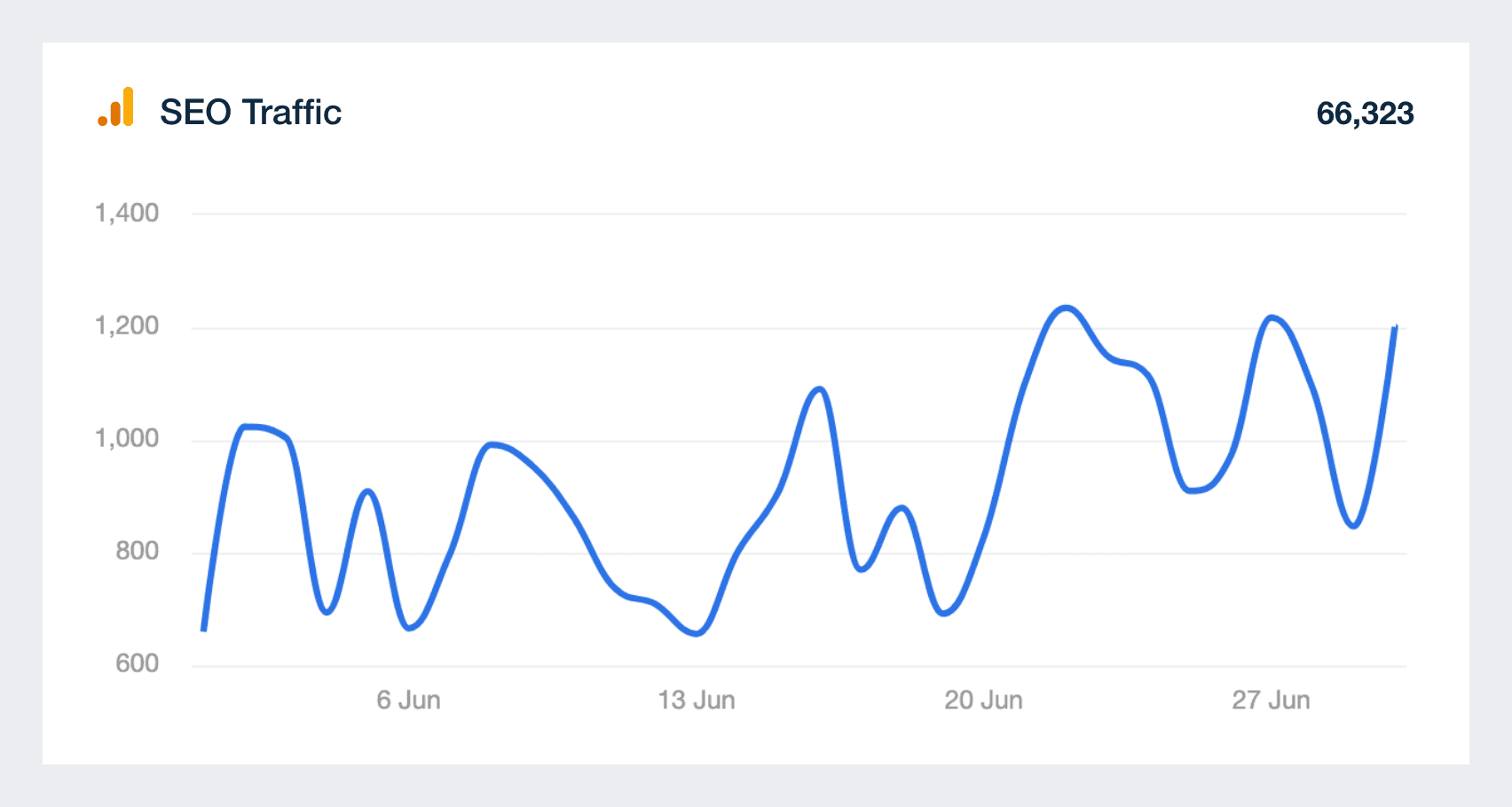
3. Organic conversions
While improved visibility may be an end goal, many clients are primarily concerned with actions that directly impact their business (e.g., sales or event sign-ups). Therefore, monitoring conversions is one tactic to gauge the quality of organic traffic.
Because conversion goals vary by client, it’s important to define SEO success early and track relevant events in analytics tools like Google Analytics. In an AI-influenced search environment, conversions also help demonstrate SEO value even when overall traffic fluctuates.
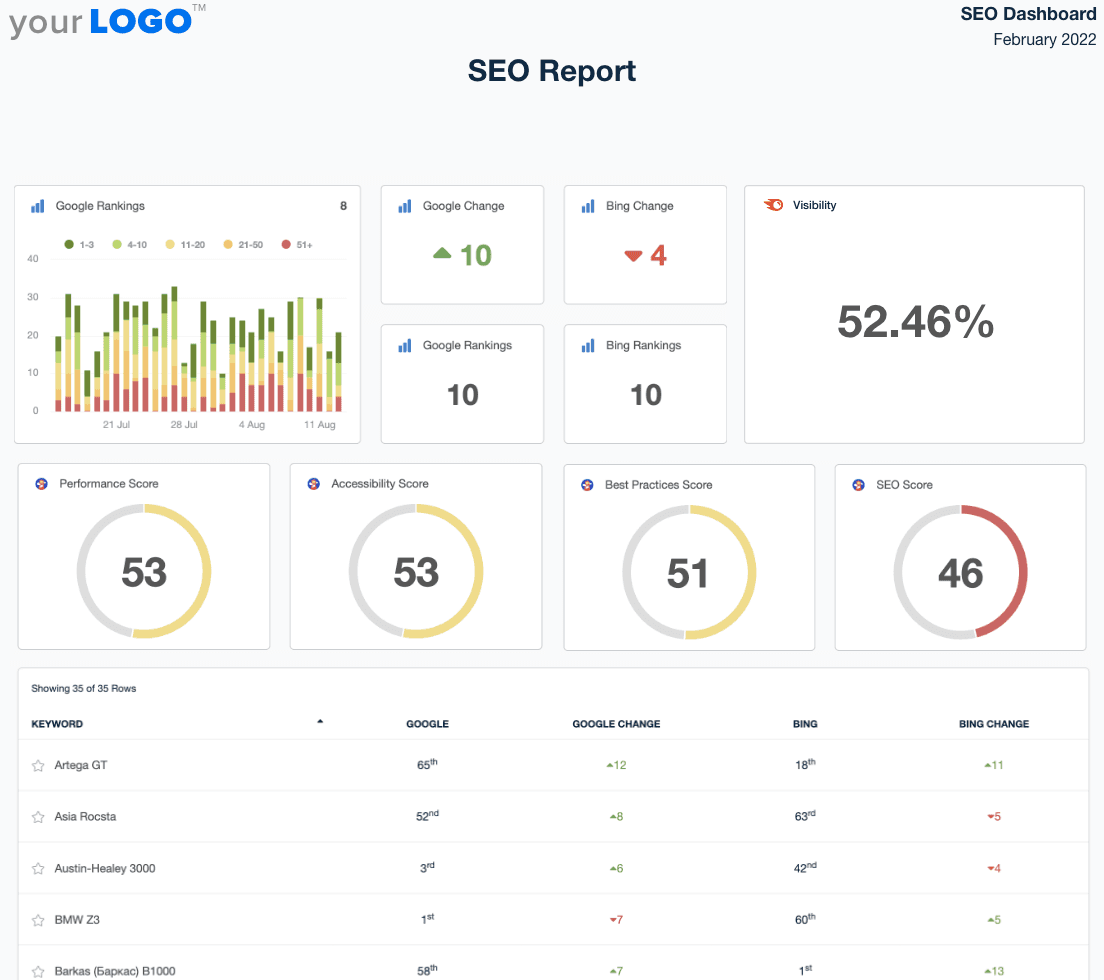
Use this professional SEO report template to consolidate data across multiple platforms, share useful insights, and make a positive impression. Try AgencyAnalytics today, free for 14 days.
4. Competitor analysis
Tracking competitors provides valuable context for any SEO campaign. It uncovers keyword gaps, content opportunities, and areas where competitors may have weaker visibility or authority.
Competitor analysis also highlights industry trends and shows how other brands earn prominence across search results and SERP features.
We always encourage our clients to be famous for something their prospects genuinely care about. Keyword research will tell you what your prospects care about–competitor analysis will give you information on how to stand out.
Warren Thompson, Co-Founder and Managing Director, Ollo Metrics
Wondering how to compare a client’s SEO performance to industry standards? Check out the benchmarks feature in AgencyAnalytics for reliable first-party data based on data from 150,000+ campaigns. It’s even possible to segment by industry and country–try it with a free 14-day trial.
5. SEO site health
Maintaining a technically sound website is essential for strong SEO performance. That’s because on-page and technical issues often limit crawlability, indexing, and overall visibility. Proactive website optimization enhances the user experience, improves search performance, and prevents long-term SEO setbacks.
We conduct comprehensive technical SEO audits to identify and address any issues that could hinder performance. This includes optimizing website speed, improving site architecture, and enhancing mobile responsiveness.
Omar Muñoz, Co-Founder, REInvestor SEO
For best results, utilize an SEO audit tool (such as Google Search Console) to identify and resolve technical issues before they affect search engine rankings or inclusion in AI-generated results.
The best SEO tracking tools & software in the industry
Now that we’ve covered the basics, here’s a list of top SEO tools used by agencies like yours (both free and paid options).
Free tools
Agencies often rely on free tools in their early stages, as they offer a solid foundation and introduction to SEO tracking.
Here are three popular ones:
Google Analytics (GA): This platform offers insights into website performance, including organic traffic, user behavior, and conversions. It’s a must-have for understanding post-click SEO analytics, including how organic traffic contributes to client goals.
Google Search Console (GSC): Use this tool to monitor search performance, identify indexing and technical issues, and access keyword data directly from Google. GSC is critical for understanding visibility across search results, including impressions, clicks, and indexing status.
Looker: Formerly known as Google Data Studio, this tool allows agencies to create dashboards and visualize performance data from multiple sources. This makes it a useful option for presenting SEO performance and sharing insights with clients.
GA and GSC are all staples for SEO analysis, even for more mature agencies. Together, they provide a comprehensive view of search performance, user behavior, and technical health across the Google ecosystem.
While Looker is a solid starting point for reporting, it may become limiting as your client base and data needs grow. As reporting complexity increases, agencies often require more features and bandwidth, making a paid solution a practical long-term choice (which we’ll cover next).
Paid tools
Paid SEO tools offer advanced features that help agencies streamline tracking, analysis, and reporting. Compared to free solutions, they deliver more reliable data, broader functionality, and fewer limitations as client demands grow.
For added context, here are a few tried-and-true SEO tools worth considering.
Tool | Description | Features | Pricing |
|---|---|---|---|
An all-in-one platform built specifically for agencies, designed to streamline SEO tracking and client reporting. | Client reporting, automation, multi-integration dashboards, agency-focused workflows. | Agency plan starts at $179/month. | |
A widely used SEO tool known for its backlink analysis and keyword research. Often used for competitive analysis and content planning. | Backlink analysis, keyword research, competitor insights. | Standard plan starts at $249/month. | |
An SEO platform used for keyword tracking, site audits, backlink analysis, and long-term SEO trend analysis. | Keyword tracking, site audits, competitive research. | Guru plan starts at $208.33/month. | |
An SEO tool offering rank tracking, link analysis, and keyword research. Features a user-friendly interface for teams new to SEO. | Rank tracking, link metrics, ease of use. | Medium plan starts at $179/month. | |
An SEO tool focused primarily on backlink intelligence. Offers detailed insights into link profiles, trust signals, and domain authority. | Backlink analysis, link trust, and citation metrics. | Pro plan starts at $99.99/month. |
So, what’s the advantage of an all-in-one reporting tool?
Depending on your agency’s size and client roster, you may end up using one dedicated SEO platform (or a combination of several). There’s just one thing: if you’re not centralizing that data, you’ll end up toggling between platforms, manually exporting metrics, and stitching reports together by hand. Plus, what happens when you’re tracking efforts outside of SEO?
That’s where a platform like AgencyAnalytics comes in. It consolidates data in one place, allowing your agency to automate SEO reporting, track performance across multiple campaigns, and deliver insights with ease.
How to use AgencyAnalytics for SEO performance tracking and reporting
Wondering how to get the most from AgencyAnalytics? With this tool, you’ll get access to:
80+ integrations–including GA, GSC, Ahrefs, Semrush, Moz, and Majestic–regardless of pricing plan.
Agency-centric solutions like AI-powered data analysis, industry-specific reporting benchmarks, and a built-in keyword rank tracker.
A pre-built SEO report and SEO dashboard template, which speeds up onboarding across multiple clients.
A drag-and-drop editor, if you prefer to build a custom report or dashboard. Even generate an 11-second Smart report or Smart dashboard!
More specifically, here’s an overview of how to use top SEO integrations in AgencyAnalytics to track performance and deliver clear, efficient reporting.
Rank Tracker tool
Since search engine algorithms are constantly changing, manual keyword tracking is neither practical nor reliable.
The fix? Use the built-in Rank Tracker tool in AgencyAnalytics to automatically pull keyword data from Google and Bing (available as an add-on for $50/month for 500 keywords).
Use this rank tracking tool to:
Create data visualizations of keyword ranking trends over a specific time frame.
Track keyword rankings based on multiple locations and languages (which is useful for local SEO campaigns).
Provide actionable recommendations, share data-driven SEO ROI, and show why you’re worth partnering with.
Ahrefs
Ahrefs is a powerful SEO monitoring tool commonly used for backlink analysis, keyword research, and competitive insights. When paired with AgencyAnalytics, it helps agencies track off-page SEO performance and understand how link-building efforts contribute to overall search visibility.
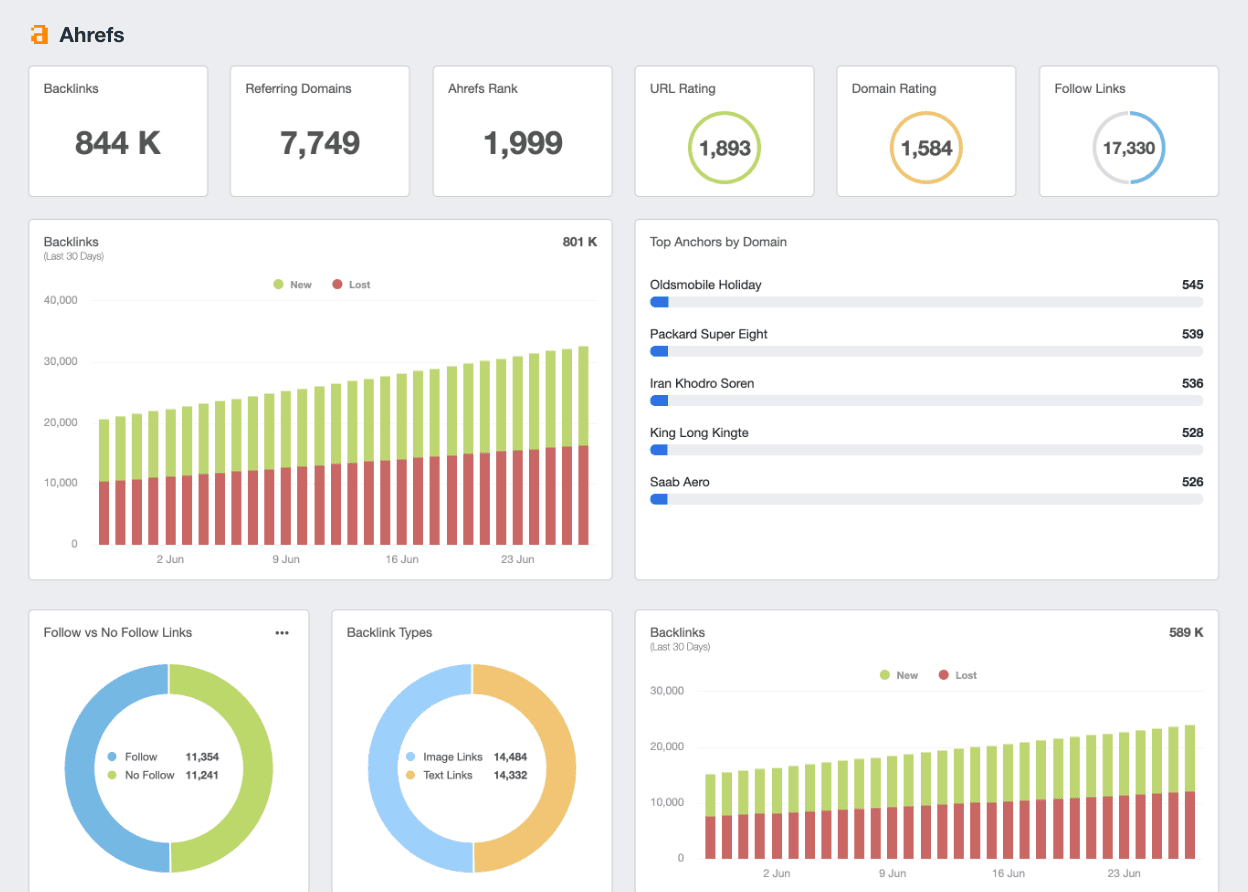
Use the Ahrefs integration to:
Assess backlink profiles, link quality, referring domains, and anchor text distribution.
Monitor new and lost backlinks to evaluate the impact of link-building campaigns.
Research competitor domains to uncover link opportunities and content gaps.
Semrush
Semrush is an all-in-one SEO platform designed to support keyword tracking, backlink analysis, and competitive research. It’s useful for monitoring long-term SEO trends and identifying opportunities (across both on-page and off-page efforts).
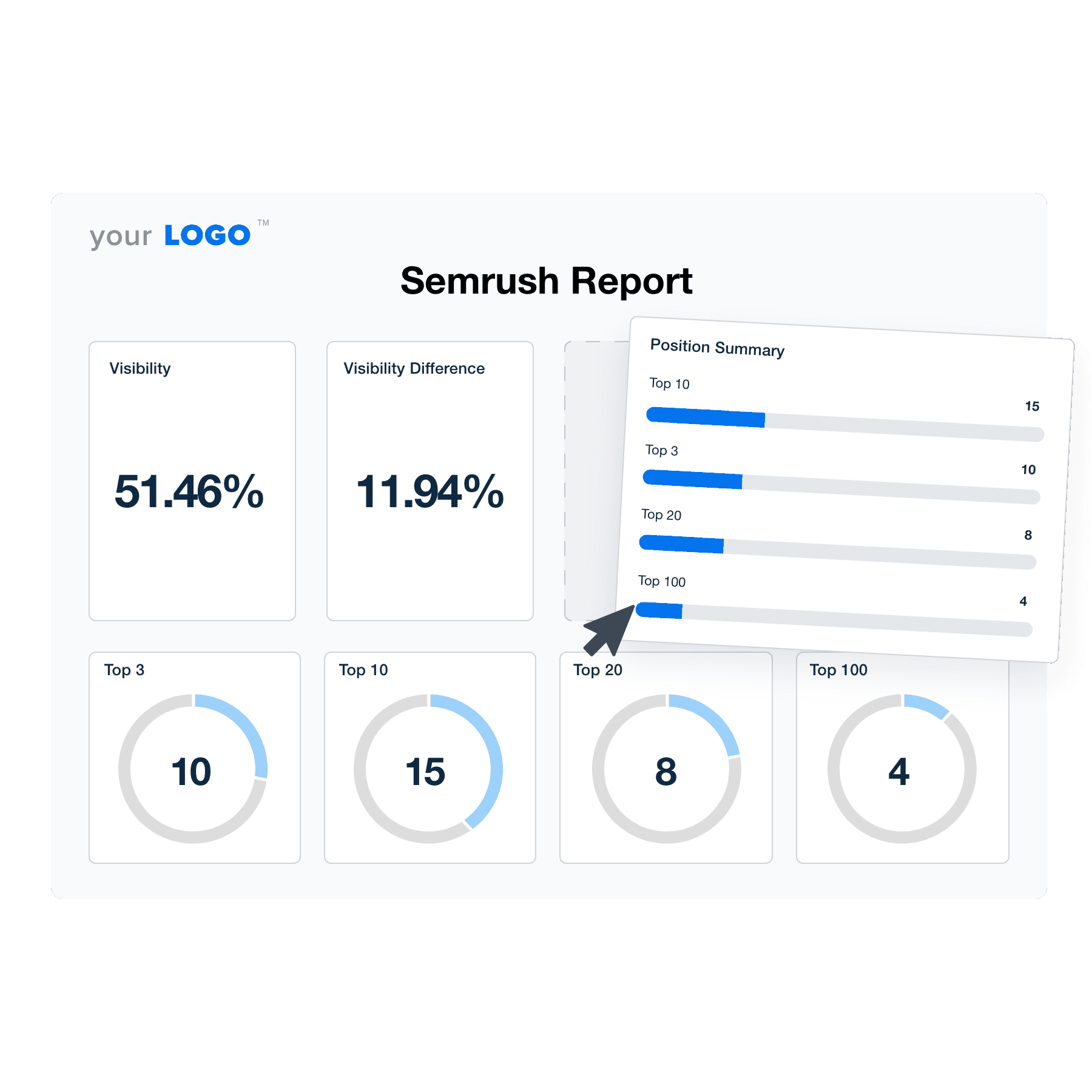
The Semrush integration is handy for:
Tracking keyword rankings and visibility trends across desktop and mobile SERPs.
Monitoring changes in anchor text trends over time to ensure a balanced and diversified backlink profile.
Analyzing competitor strategies, including keyword targeting and backlink profiles.
Majestic
Majestic is a backlink-focused SEO tool built for evaluating off-page SEO performance and link authority. It provides detailed insight into how links contribute to a site’s trust, credibility, and overall search presence.
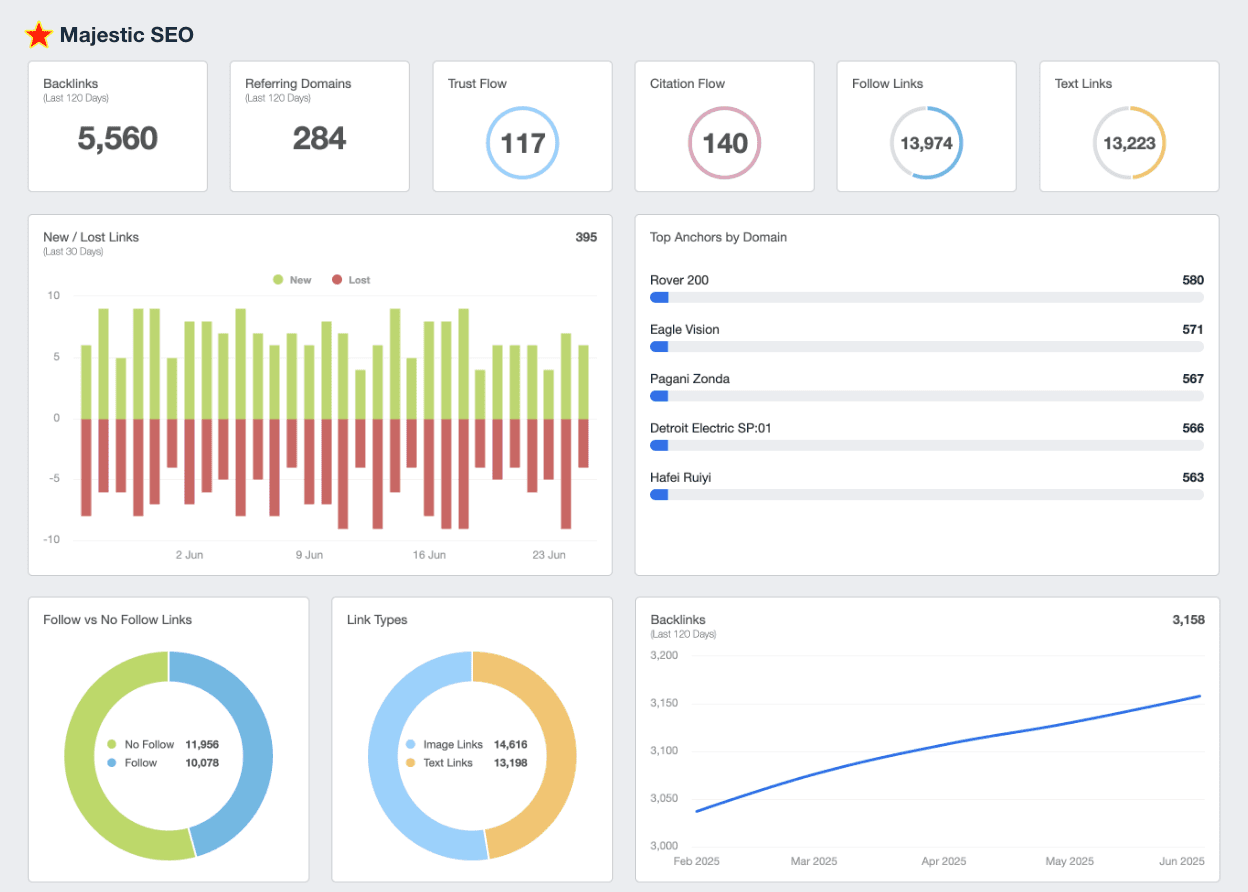
The Majestic integration helps agencies:
Track backlink growth by monitoring new and lost links tied to link-building efforts.
Measure Trust Flow and Citation Flow to better understand backlink quality and authority signals.
Compare competitor backlink profiles to uncover potential outreach and partnership opportunities.
SEO site audits
SEO site audits are one of the most effective ways to uncover optimization opportunities and identify quick technical wins. By running regular audits, agencies can proactively surface issues that may be limiting search performance.
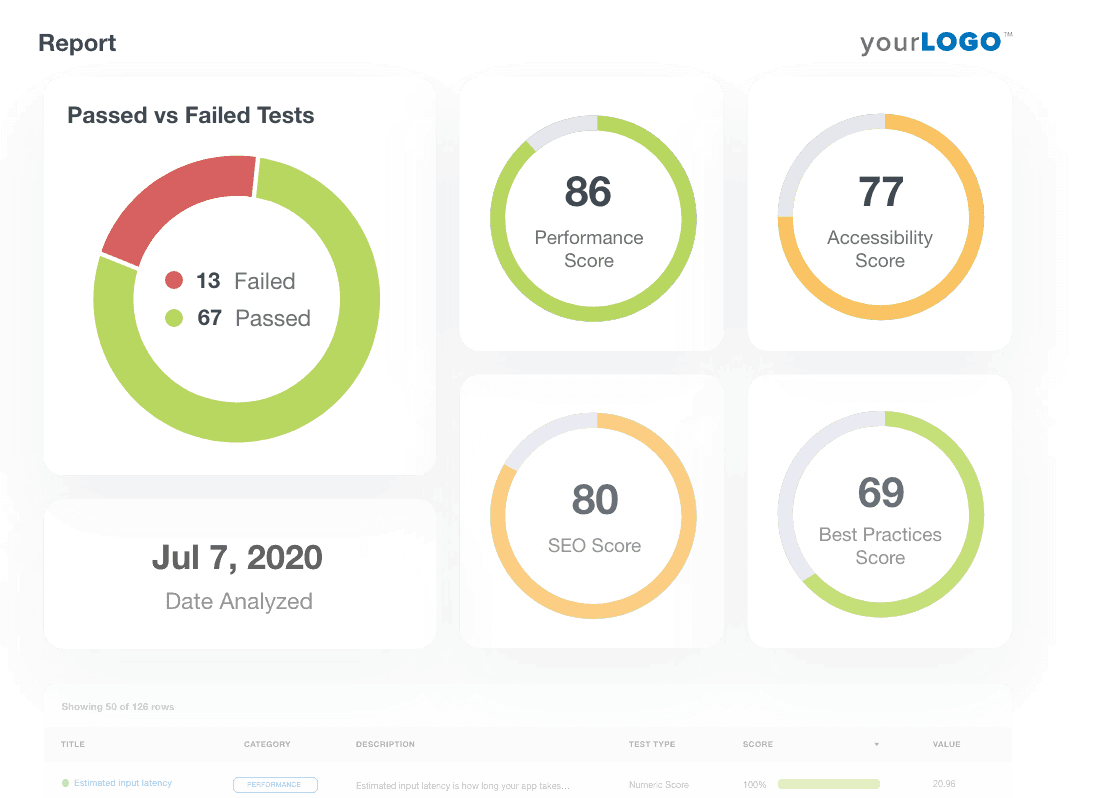
To run an SEO site audit, simply enter a URL into an audit tool to analyze technical, on-page, and performance-related issues. Common findings often include:
404 errors
Duplicate images or content
Broken internal and external links
To stay on top of search performance, establish a consistent audit cadence, such as monthly checks. Many agencies also offer site audits as a one-off service to identify immediate opportunities and set a baseline for future optimization.
AgencyAnalytics integrates with leading SEO audit tools, including Google Search Console, Google Lighthouse, Moz, and Google PageSpeed. Monitor key SEO metrics in including Core Web Vitals, search volume, mobile usability, page speed, and more.
Impress clients and save hours with custom, automated reporting.
Join 7,000+ agencies that create reports in under 30 minutes per client using AgencyAnalytics. Get started for free. No credit card required.
Already have an account?
Log inKey takeaways: SEO tracking requires a strategy and consistent effort
SEO tracking starts with a clear digital marketing strategy and depends on consistent measurement. This includes tracking visibility, technical health, competitor performance, and user actions.
And as search continues to evolve, agencies need a reliable way to monitor progress and adjust campaigns efficiently. When you’re dealing with multiple clients, though, manually preparing in-depth SEO reports feels like a relentless clock-chewing monster.
Why waste time on tedious administrative tasks? Instead, invest in a platform like AgencyAnalytics to simplify data collection, streamline trend analysis, and remove the grunt from client reporting. Whether you’re using a pre-built white-label SEO report, tracking real-time data, or generating an AI-powered performance summary, AgencyAnalytics turns SEO data into meaningful insights.
The result? Clearer reporting, smarter decisions, and stronger long-term SEO performance.
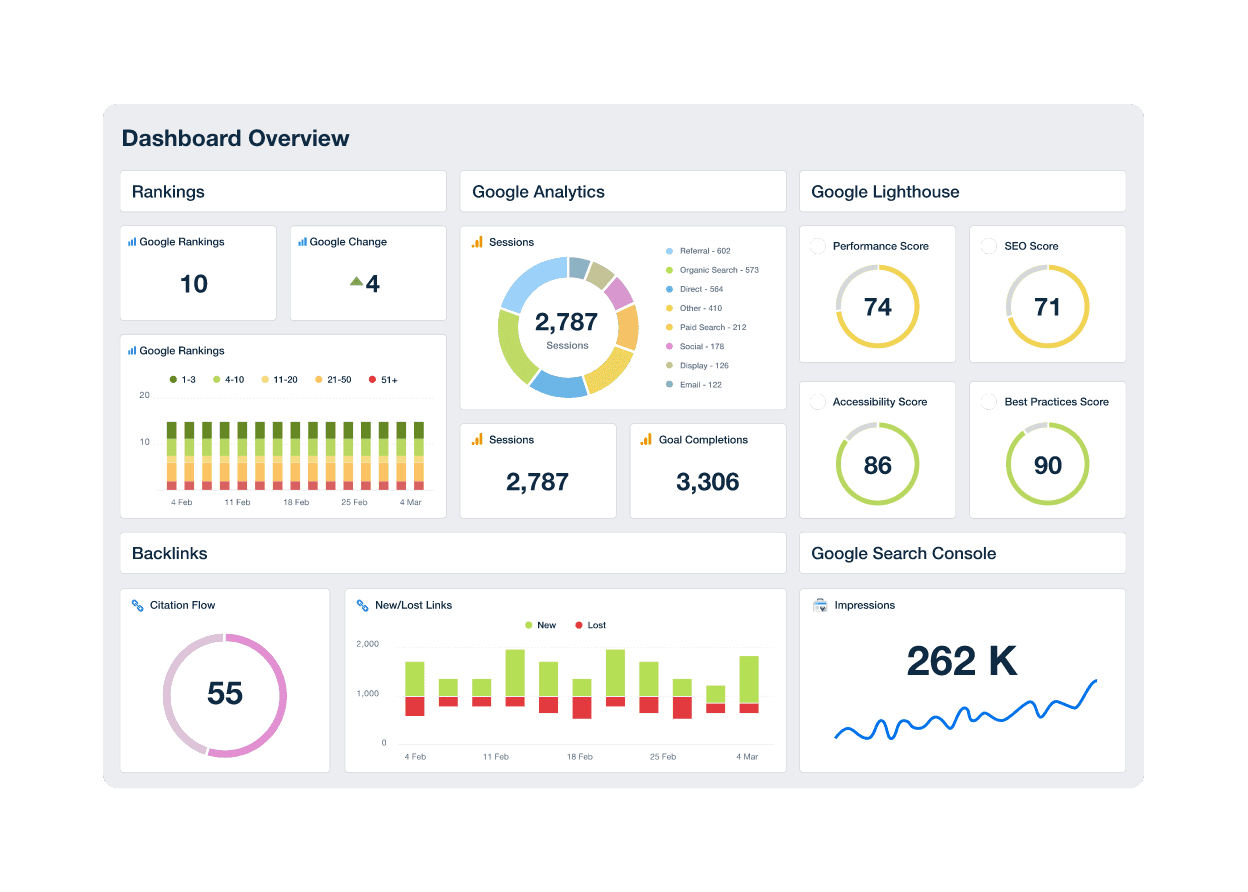
Tracking data doesn’t have to be a headache. Easily monitor data across SEO efforts, paid ads, and other key platforms–try AgencyAnalytics today, free for 14 days.
FAQs About SEO Tracking
Still have questions about SEO tracking? Don’t worry... we’ve got you covered!
Rank tracking contributes to SEO success by showing how a website’s visibility changes in search results over time. It helps agencies measure the impact of SEO efforts, identify opportunities for optimization, monitor competitors, and connect ranking movements to changes in traffic and conversions. This makes it easier to prove progress and guide strategy.
Several attribution models apply to SEO tracking, depending on how organic search fits into the customer journey. Common models include first-touch attribution, which credits SEO with initial discovery; last-touch attribution, which assigns value to the final conversion; and linear attribution, which distributes credit across all touchpoints. Time-decay and position-based models are also useful, as they recognize SEO’s influence throughout the funnel—not just at the point of conversion.
A strong SEO tracking cycle involves daily monitoring of critical metrics, weekly trend analysis, and monthly in-depth performance reviews. This ensures ongoing optimization, helps identify issues early, and keeps clients informed with clear reporting.
A great SEO report includes traffic trends, ranking changes, backlink analysis, and key insights on campaign performance. With AgencyAnalytics, agencies automate client reports, ensuring clarity and transparency while saving hours of manual work.
Agencies ensure full tracking of SEO KPIs by defining clear goals upfront and aligning them with measurable metrics such as rankings, organic traffic, conversions, and engagement. They integrate reliable data sources like Google Search Console and analytics platforms, use consistent keyword and conversion tracking, and centralize reporting in a single dashboard.
Proxies help with SEO rank tracking by allowing tools to simulate searches from different locations and devices without triggering search engine restrictions. They prevent IP blocking, reduce the risk of captchas, and ensure more accurate, location-specific ranking data. This is especially important for agencies tracking rankings across multiple regions or clients at scale.

Written by
Faryal Khan is a multidisciplinary creative with 10+ years of experience in marketing and communications. Drawing on her background in statistics and psychology, she fuses storytelling with data to craft narratives that both inform and inspire.
Read more posts by Faryal KhanSee how 7,000+ marketing agencies help clients win
Free 14-day trial. No credit card required.





